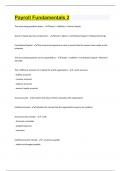Exam (elaborations)
Payroll Fundamentals 2 questions and Answers
- Course
- Institution
The accounting equation states: - Assets = Liabilities + Owners Equity Owner's Equity has two components: - Owner's Equity = Contributed Capital + Retained Earnings Contributed Capital - The amount of payments in cash or assets that the owners have made to the company The accounting equation ca...
[Show more]



